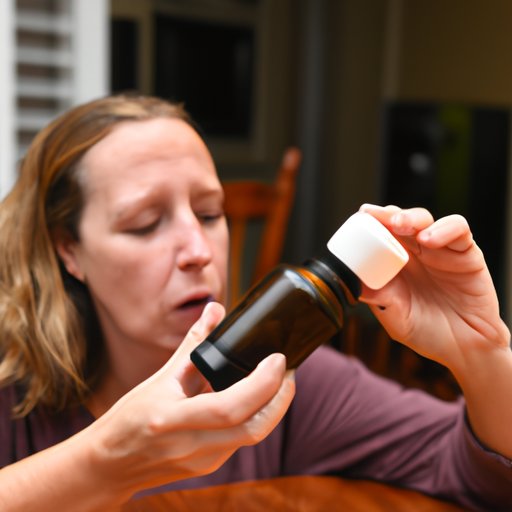
Introduction
Dizziness is a common condition that affects people of different ages and can interfere with their daily life. It is often described as a feeling of lightheadedness, unsteadiness, or spinning sensation. Dizziness can be caused by a variety of underlying factors, which can range from dehydration to medical conditions such as vertigo and low blood pressure. Identifying the cause of dizziness is crucial to managing it effectively. In this article, we will discuss several tips and remedies to help combat dizziness and promote general well-being.
Countering Dizziness with Hydration
Dehydration is a common cause of dizziness, particularly on a hot day or after physical activity. Drinking plenty of water is one of the easiest ways to counter dizziness and promote hydration. Experts recommend drinking at least eight glasses of water every day. Additionally, electrolyte-rich drinks such as sports drinks and coconut water can help replenish the body’s fluids and minerals lost through sweating. It is crucial to avoid caffeinated drinks as they can dehydrate the body further and trigger dizziness.
Identifying the Causative Factors
Dizziness can be caused by a range of factors, including vertigo, low blood sugar, motion sickness, anxiety, stress, and medication side effects. Recognizing the underlying cause is the key to managing dizziness effectively. For example, if dizziness is caused by vertigo, it may be necessary to undertake specific medical treatments to address the cause. Similarly, if dizziness is due to low blood sugar, it may be necessary to adjust diet and exercise habits to balance blood sugar levels. It is crucial to consult a doctor if you frequently experience episodes of dizziness.
Practicing Breathing Exercises
Breathing exercises can help combat dizziness by promoting relaxation and oxygenation. One of the most effective breathing techniques is deep breathing. Sit in a relaxed position, inhale deeply through your nose, and exhale slowly through your mouth. Pranayama, a set of breathing exercises used in yoga, can also help combat dizziness. Yoga poses such as the mountain pose, tree pose, and child’s pose can promote relaxation and reduce stress levels. Practicing breathing exercises and yoga regularly can significantly reduce dizziness and promote overall well-being.
Engaging in Physical Movement
Light physical activity can help manage dizziness by increasing blood flow and promoting oxygenation. Walking, swimming, and cycling are low-impact exercises that can help alleviate symptoms of dizziness. It is crucial to start slowly and gradually increase the intensity and duration of the exercise over time. Physical activity can help maintain general fitness and promote a healthy lifestyle.
Aromatherapy & Essential Oils
Aromatherapy is an alternative therapy that uses essential oils to promote health and well-being. Several essential oils can help manage dizziness, including ginger oil, peppermint oil, and lavender oil. Ginger oil can help alleviate nausea and promote digestion, while peppermint oil can help calm the nervous system and reduce stress levels. Lavender oil can promote relaxation and improve sleep quality. It is essential to use essential oils safely and consult a qualified aromatherapist to recommend appropriate oils and methods of use.
Limiting Caffeine and Alcohol
Caffeine and alcohol consumption can affect the body and trigger dizziness. It is essential to limit the consumption of caffeinated and alcoholic drinks and substitute them with herbal tea, water, and fruit juice. Additionally, it is crucial to track the intake of these drinks and make necessary adjustments to promote hydration.
Taking Prescribed Medication
Prescribed medication can help manage dizziness due to medical conditions. It is essential to consult a doctor and follow recommended dosage and duration. It is also important to understand possible side effects and how to manage them effectively.
Conclusion
Dizziness can be a challenging condition to manage, but there are several tips and remedies available to promote well-being. Staying hydrated, identifying the cause of dizziness, practicing breathing exercises, engaging in physical activity, and using aromatherapy and essential oils are effective ways to manage dizziness. Limiting caffeine and alcohol consumption and taking prescribed medication can also help alleviate symptoms. It is essential to adopt healthy lifestyle choices and seek medical attention if necessary. Contact relevant health organizations and websites for more information and resources.




